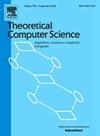关于近似部分场景集覆盖
IF 0.9
4区 计算机科学
Q3 COMPUTER SCIENCE, THEORY & METHODS
引用次数: 0
摘要
部分场景集合覆盖问题(PSSC)概括了部分集合覆盖问题,而部分集合覆盖问题本身就是经典集合覆盖问题的概括。我们给定了一个有限地面集合 Q、一个可供选择的 Q 子集集合 S(每个子集的成本都是非负的)以及 Q 的第二个子集集合 U(其中必须覆盖给定数量 l 的子集)。我们提出了两种近似方法。我们提出了两种近似方法。第一种方法将基于 LP 的舍入法与对场景的贪婪考虑相结合。另一种是贪婪集覆盖算法的变体,在每次迭代中都试图最小化成本与新覆盖场景数量之比。我们证明,即使只有一个场景,且所有集合最多包含三个元素,这个我们称为密集场景集合覆盖(DSSC)的子问题本身与集合覆盖一样难以近似,而且是 NP 难问题。此外,我们还考虑了 DSSC 的一种特殊情况,即集合是成对不相交的,并证明在这种情况下,DSSC 可以在多项式时间内求解。我们还提供了一般情况下的近似值,并将其作为贪婪算法的子程序,从而获得 PSSC 的近似值。本文章由计算机程序翻译,如有差异,请以英文原文为准。
On approximating partial scenario set cover
The Partial Scenario Set Cover problem (PSSC) generalizes the Partial Set Cover problem, which is itself a generalization of the classical Set Cover problem. We are given a finite ground set Q, a collection of subsets of Q to choose from, each of which is associated with a nonnegative cost, and a second collection of subsets of Q of which a given number l must be covered. The task is to choose a minimum cost sub-collection from that covers at least l sets from . PSSC is motivated by an application for locating emergency doctors.
We present two approximation approaches. The first one combines LP-based rounding with a greedy consideration of the scenarios. The other is a variant of the greedy set cover algorithm, and in each iteration tries to minimize the ratio of cost to number of newly covered scenarios. We show that this subproblem, which we call Dense Scenario Set Cover (DSSC), is itself as hard to approximate as Set Cover and NP-hard, even when there is only a single scenario and all sets contain at most three elements. Furthermore, we consider a special case of DSSC where the sets are pairwise disjoint and show that in this case DSSC can be solved in polynomial time. We also provide an approximation for the general case, which we use as a subroutine in the greedy algorithm to obtain an approximation for PSSC.
求助全文
通过发布文献求助,成功后即可免费获取论文全文。
去求助
来源期刊

Theoretical Computer Science
工程技术-计算机:理论方法
CiteScore
2.60
自引率
18.20%
发文量
471
审稿时长
12.6 months
期刊介绍:
Theoretical Computer Science is mathematical and abstract in spirit, but it derives its motivation from practical and everyday computation. Its aim is to understand the nature of computation and, as a consequence of this understanding, provide more efficient methodologies. All papers introducing or studying mathematical, logic and formal concepts and methods are welcome, provided that their motivation is clearly drawn from the field of computing.
 求助内容:
求助内容: 应助结果提醒方式:
应助结果提醒方式:


